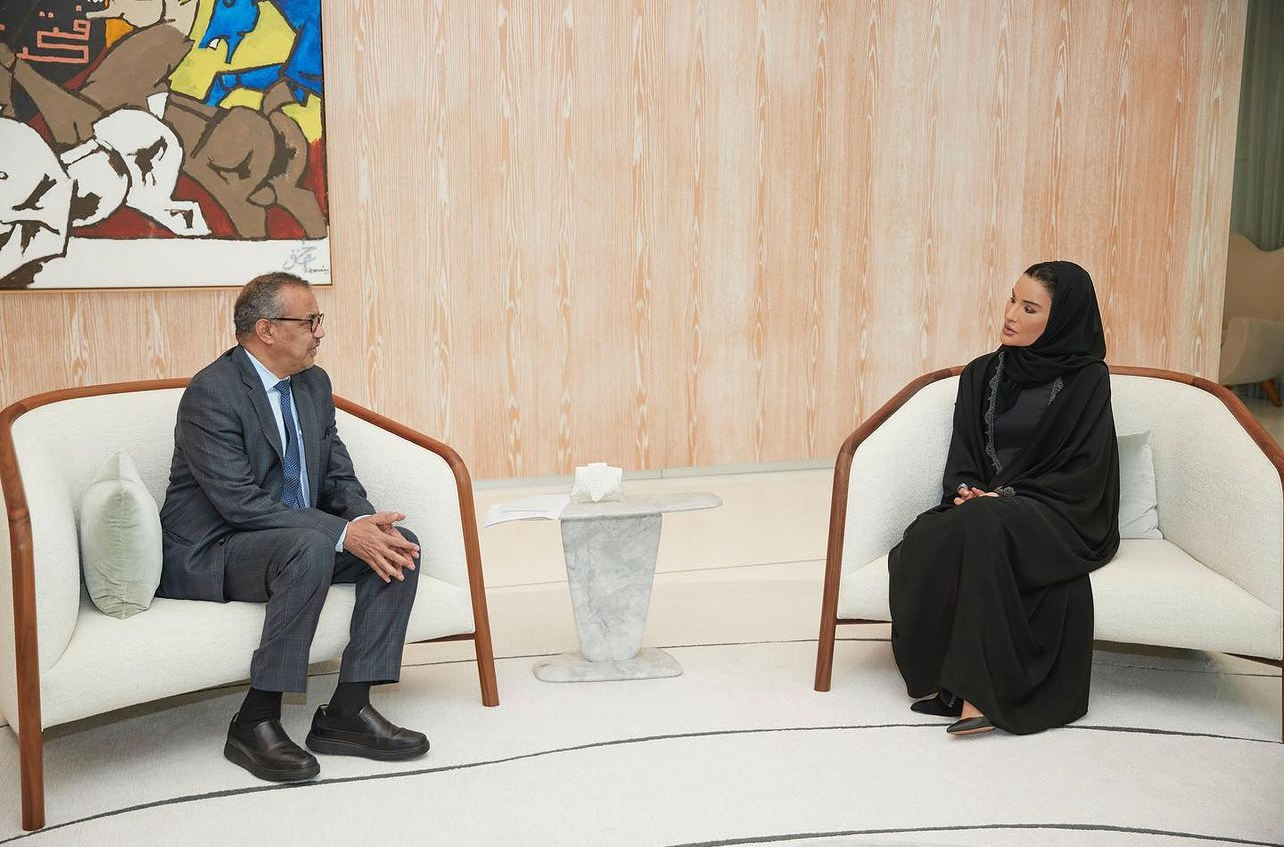Reports also emerged on Monday that WHO Director-General and the organisation’s Qatari chairperson will be convening an emergency session over the health crisis in Gaza next week.
Sheikha Moza bint Nasser, Chairperson of Education Above All (EAA), has met with the World Health Organisation’s (WHO) Director-General, Dr Tedros Adhanom Ghebreyesus.
In a post shared via Instagram on Monday, Sheikha Moza said that the two discussed “the catastrophic state of the health system and hospitals in Gaza, due to the ongoing Israeli aggression”.
Sheikha Moza has voiced her staunch opposition to Israel’s onslaught in Gaza.
On 15 November, reports emerged from Al Jazeera that the Qatari royal had withdrawn from her position as UNESCO Goodwill Ambassador.
According to Al Jazeera, this was due to the organisation’s failure to “carry out its role in rescuing and providing relief to the children of Gaza, who are the main victims of Israel’s ongoing bombardment campaign”.
On November 15, Sheikha Moza also posted on Instagram a snippet from her address during Turkey’s United for Peace in Palestine high-level summit where she expressed her “disappointment” in what she referred to as UNESCO’s silence on the destruction of educational facilities and the killing of children by Israel in Gaza.
WHO emergency meeting on Gaza
Reuters has reported that Director-General Dr Ghebreyesus, in consultation with the WHO’s Qatari chairperson, Dr Hanan Mohamed Al Kuwari, will be convening a rare WHO executive board emergency session on December 10.
Sunday’s meeting, according to Reuters’ December 4 report, was initiated by the urgent request of 15 countries to discuss the health crisis in Gaza and the occupied West Bank amid Israel’s resumed bombardment.
On Monday, WHO reported that hospital bed occupancy rate was at breaking point and currently stands at 171 percent. While in intensive care units, the rate was exponentially worse at 221%.
WHO urged Israel to adhere to international law and take every step necessary to protect civilian life and infrastructure, including hospitals.
A statement published by the UN Office for the Coordination of Humanitarian Affairs (UN OCHA) on Monday attributable to the UN’s Secretary-General, António Guterres, emphasised “the need for unimpeded and sustained humanitarian aid flow to meet the needs of the people throughout the Strip”.
In another statement published by UN OCHA on Monday, Lynn Hastings, the Humanitarian Coordinator for the Occupied Palestinian Territory, said that “the conditions required to deliver aid to the people of Gaza do not exist”.
Hastings further slammed Israel for expanding military operations into southern Gaza, which is forcing “tens of thousands of [Palestinians] into increasingly compressed spaces, desperate to find food, water, shelter and safety”.
Speaking to Reuters about December 10’s upcoming emergency meeting, Ibrahim Khraishi, Palestine’s ambassador to the UN in Geneva, said “We want to empower the WHO and call for the Israeli side not to target the medical sector. We want to allow for fresh medical supplies”.
Israeli crimes against education
Three days after Israel’s latest onslaught on the Gaza Strip began on October 7, EAA’s Al Fakhoora House was razed by Israeli shelling.
In an October 10 press release about Al Fakhoora House’s destruction, EAA described the establishment as once being a “safe space for students and families in an area that hosts civil society and international organizations”. That same day via Instagram, Sheikha Moza decried Israel’s bombing of the centre as an “unforgivable crime” against education.
Revisiting the tragedy of Al Fakhoora being bombed, the Qatari royal said during her inaugural speech at the WISE Summit’s 11 edition on November 29 that, “since the start of the current Israeli aggression in October, 36 EAA supported schools and universities have been completely or partially destroyed”.
Beyond catastrophically disrupting education, Her Highness also added during her WISE Summit speech that Israeli aggression takes a toll on the local health sector and hinders development, leaving the war victims to “rise from the ashes left by the destruction, and start again with nothing”.







